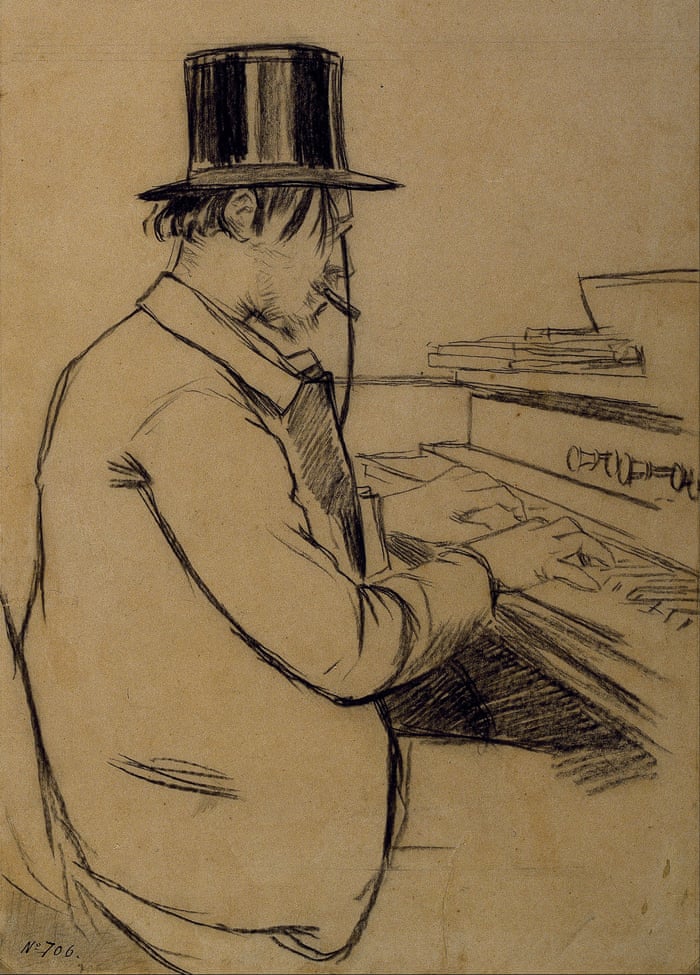Erik Satie was a French composer and pianist who lived from 1866-1925. He is best known for his unique and pioneering musical style, which often featured simple melodies accompanied by drones or repetition of notes, as well as his use of unexpected tonalities and harmonies. His works are characterized by economy of means, precision, clarity of form, simplicity and eccentricity.
Satie wrote in many different genres including chamber music (Gymnopedies), solo piano pieces (Vexations), ballets (Parade) and choral works (Cantique de Jean Racine). He also popularized the idea of furniture music – short pieces designed to be background ambiance rather than foreground listening material. Satie’s influence on modern classical music is undeniable; numerous composers have drawn inspiration from his work such as Debussy, Ravel and John Cage.
Erik Satie was a French composer and pianist who lived from 1866 to 1925. He is credited with being the founder of modern ambient music due to his piano works which had simple melodies, repetitive structures, and lack of harmonic development. His music has been used in films such as The Truman Show and Eternal Sunshine of the Spotless Mind, proving that he still resonates with today’s audiences.
Satie: Complete Piano Works Vol.1
What is Erik Satie’S Most Famous Piece?
Erik Satie’s most famous piece is “Gymnopédies”. It is a three-piece suite composed in the late 19th century. It consists of:
• “Gymnopédie No. 1” – written by Satie in 1888
• “Gymnopédie No. 2” – written by Satie in 1889
• “Gymnopédie No. 3” – written by Satie in 1897
The simple and elegant composition has become an iconic part of classical music, widely recognized for its peaceful yet melancholic character.
What Does Gymnopedie Mean in English?
Gymnopedie is a musical term that refers to solo piano compositions written by the French composer, Erik Satie. The name comes from a Greek word meaning “to dance in circles” and reflects Satie’s intention for his compositions:• To be light, airy and graceful.
• To evoke feelings of peacefulness and relaxation.
• To have an atmosphere of mysticism or ethereal beauty.
The Gymnopedies are among the most popular works of classical music – both inside and outside the world of classical music – due to their accessibility and unique soundscape created by Satie’s unconventional harmonic progressions.
What is Erik Satie Known For?
Erik Satie was a French composer and pianist who is known for his unique, avant-garde music. He was one of the first composers to incorporate elements of minimalism in his works. His pieces were often marked by unusual structures, repetitive rhythms and other unconventional features.
He is best known for:
• Gymnopédies – rhythmic piano compositions from 1888–1889
• Gnossiennes – solo piano compositions from 1890–1893
• Vexations – a minimalist piece that can last up to 18 hours if performed in its entirety
Satie’s influence continues today with many modern artists citing him as an inspiration for their work.
Why is Gymnopedie So Famous?
Gymnopedie is a famous piano solo composed by Erik Satie in 1888. It’s renowned for its minimalistic style and unique musical structure, which has made it an enduring classic of the genre.
The reasons why Gymnopedie is so famous include:• Its distinct harmonic language – Satie used major chords combined with dissonance to create a sound that was new at the time. • Its use of syncopated rhythms – this creates an unpredictable sense of tension and surprise. • Its dream-like atmosphere – the music creates a feeling of serenity, making it popular among many listeners.
In short, Gymnopedie’s timeless appeal lies in its combination of distinctive harmonies and rhythm, as well as its ability to evoke peaceful emotions through its ethereal melodies.

Credit: www.theguardian.com
Erik Satie Gnossiennes
The Erik Satie Gnossiennes are a series of solo piano compositions written by French composer Erik Satie. These works, composed between 1890 and 1897, draw inspiration from ancient Greek mythology and focus on the mysterious island of Gnossus. They have been highly influential in twentieth-century music, particularly in terms of their use of dissonant harmonies and unique rhythmic structures.
Erik Satie – Gymnopédie
Erik Satie was a French composer, pianist, and writer in the late 19th and early 20th centuries. He is best known for his “Gymnopédie” compositions which are among the earliest works of modern ambient music. The Gymnopédies are peaceful, melancholy piano pieces with a unique harmonic structure that has been described as “dream-like”.
Erik Satie Gnossienne 1
The first of Erik Satie’s Gnossienne pieces, “Gnossienne No. 1,” was composed in 1890 and is a gentle and atmospheric work full of subtlety and nuance. The piece builds on the French composer’s signature style, using simple melodic lines that are repeated to create an expansive soundscape. It is often performed as a solo piano piece, though it has also been transcribed for other instruments.
As with many of his works, Satie encourages performers to use their own interpretation when playing the piece – making each performance unique and special!
Conclusion
This blog post has highlighted the importance of Erik Satie’s music in history and its influence on many other genres. It has shown how his unique blend of classical, jazz, and pop music allowed him to achieve his own style which is still enjoyed by audiences today. His commitment to pushing the boundaries of modern art forms stands as a testament to his creative genius.
Satie’s compositions may not be as well-known as some other composers, but their value cannot be underestimated. Despite being relatively unknown during his lifetime, he managed to leave behind a legacy that continues to inspire musicians around the world with its innovative approach and timeless sound.